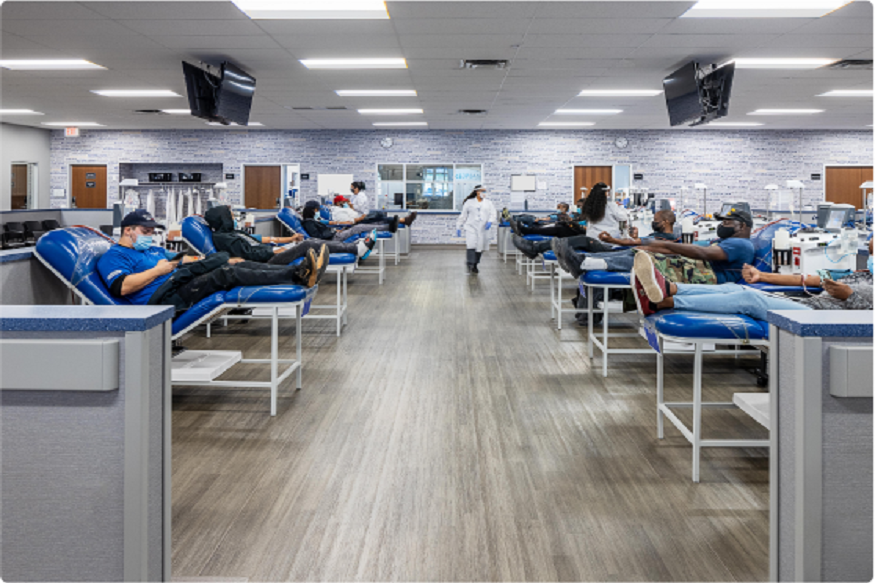Plasma donation plays a crucial role in saving lives, offering life-changing treatments for patients with conditions such as hemophilia, immunodeficiency, and burn victims. In New Jersey, several plasma donation centers provide residents the opportunity to make a significant impact on others’ lives while also receiving compensation. Whether you’re considering donating plasma for the first time or have already contributed in the past, understanding the process, benefits, and regulations specific to New Jersey is essential.
The Process of Donating Plasma in NJ
Donating plasma in NJ is a relatively simple and safe process, but it’s essential to follow the necessary steps to ensure both the donor and recipient benefit from the donation. The process begins with a screening to ensure the donor’s health is suitable for plasma donation. This includes a review of medical history, vital signs, and blood tests to check for any infectious diseases. Once cleared, donors are connected to a machine that draws blood, separates the plasma, and returns the red blood cells, white blood cells, and platelets back to the donor’s body.
The entire process typically takes around 90 minutes to two hours, with the plasma donation itself lasting about 30-40 minutes. It’s important to stay hydrated and eat a healthy meal before donating, as this helps with the collection process. Donating plasma in NJ can be done once every 28 days, but many centers offer compensation, making it an appealing option for regular donors who want to help others while earning a bit of extra income.
Why Donate Plasma in New Jersey?
There are many reasons why people choose to donate plasma in New Jersey. One significant factor is the need for plasma donations to treat a variety of medical conditions. Plasma is used in the production of therapies that help treat diseases like hemophilia, autoimmune diseases, and some cancers. Plasma can also be used in the manufacturing of vaccines and other medical products. By donating, you can make a direct impact on the lives of patients who rely on these treatments for survival and quality of life.
Another reason people donate plasma is for financial compensation. Many plasma donation centers in NJ offer compensation for the time and effort involved. This can be particularly helpful for students, part-time workers, or anyone looking to supplement their income. The compensation varies depending on the center and the amount of plasma donated, with some centers offering up to $50 per donation.
The Benefits of Donating Plasma
Donating plasma in NJ offers more than just the satisfaction of helping others. It also provides several health benefits. Donors often report feeling a sense of accomplishment and pride after giving plasma, knowing they’ve contributed to a greater cause. Additionally, the process of donating plasma can stimulate the production of new plasma and red blood cells, which can benefit your overall health.
Frequent plasma donation can also have health benefits, such as a reduction in the risk of heart disease. Studies have shown that regular plasma donation can help lower iron levels, which may reduce the risk of conditions like hemochromatosis and cardiovascular disease. It’s also worth noting that the process of donating plasma is generally safe and well-regulated, with strict medical standards in place to protect the donor’s health.
Things to Know Before Donating Plasma in NJ
Before donating plasma in NJ, there are several important things to keep in mind. First and foremost, it’s crucial to ensure you’re in good health. Plasma donation is only safe for people who are generally healthy and meet the required medical guidelines. You’ll be asked to answer a series of questions about your health, travel history, and lifestyle during the initial screening.
In New Jersey, the minimum age for plasma donation is usually 18, and donors must weigh at least 110 pounds. Additionally, donors should avoid donating plasma if they’ve had certain medical conditions or recent surgeries. Pregnant women, for example, are not eligible to donate plasma.
Plasma donation centers in New Jersey are typically regulated by the FDA, and the guidelines for donation are strict to ensure safety. After donation, it’s essential to take care of your body by drinking plenty of fluids and avoiding strenuous activities for the rest of the day. Following these guidelines will help ensure that your plasma donation experience is as smooth and safe as possible.
Finding a Plasma Donation Center in NJ
New Jersey offers several plasma donation centers where individuals can donate plasma regularly. Many of these centers are part of national networks like Grifols, CSL Plasma, or BioLife, and they follow the highest standards of care for donors. These centers can be found across the state, from urban areas like Newark and Jersey City to smaller towns, ensuring that anyone interested in donating can easily find a nearby location.
When choosing a plasma donation center in NJ, it’s important to research the center’s reputation and read reviews from other donors. Look for centers with clean, well-maintained facilities, friendly staff, and a focus on donor safety and comfort. Some centers even offer additional perks such as referral bonuses or discounts for first-time donors, making it even easier to get started with the donation process.

